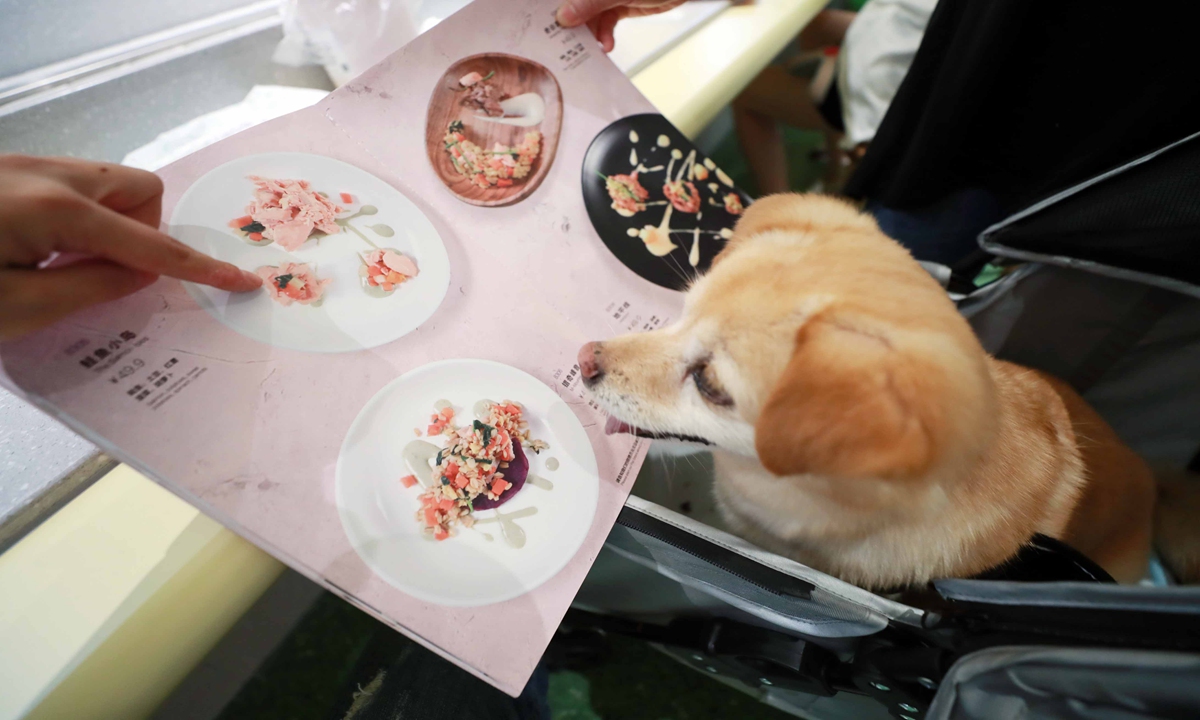
Shanghai's first restaurant for pets Photo: IC
With the imminent arrival of the Spring Festival holidays, millions of people across China are preparing to reunite with their families to celebrate the nation's most significant festival.
However, it presents a pressing concern for pet owners who live far away from their hometowns: what to do with their beloved animals during this festive period?
Wang, a native of East China's Anhui Province, who works in Beijing, has been pondering this question for some time, due to concerns about leaving her one-and-a-half-year-old cat unattended while she returns home for the holidays.
During the National Day holidays, she installed cameras at home, stocked up on cat food and water, and arranged for friends to check in regularly. "Seeing him lying in front of the camera made me feel sorry for him," Wang told the Global Times.
This Spring Festival, in addition to considering previous arrangements, she has also contemplated pet care institutions but is worried about limited space and about her cat's adjustment to an unfamiliar environment.
Fortunately, she learned that a friend's roommate would be staying in Beijing during the holidays and could take care of her cat.
Wang is just one of many pet owners facing the dilemma about pet care during the upcoming holiday. According to Petdata.cn, the number of pet dogs in China reached 51.75 million in 2023, a 1.1 percent increase from the previous year, while the number of pet cats reached 69.8 million, up 6.8 percent. The number of households with dogs and cats in China is expected to be more than 87 million.
Some, like Lan, choose to bring their pets home for the holidays. She flew with her family, including her kitten, to Southwest China's Yunnan Province. Since not all airlines accommodate pet transport, she opted for a specific airline, Hainan Airlines, that allows pets in the passenger cabin for 1,399 yuan ($184.58) per pet.
For those unable to bring their pets home, pet hospitals or pet care institutions are another option. Liu has spent 1,500 yuan ($211) to board his cat at a pet hospital in Beijing's Chaoyang district, saying it was an affordable choice due to early booking.
But the surge in demand for pet care services has been accompanied by price increases. A rough comparison by Beijing Business Today found that pet boarding prices during this Spring Festival have risen by approximately 30 percent compared to regular rates, averaging around 150 yuan per day, varying according to pet size and included services.
Some pet shops even offer vacation-style and hotel-style boarding, with prices reaching 1,299 yuan per day. Within Beijing's third ring road, one claims to be a five-star hotel for pets, offering various amenities such as sunshine rooms for cats at approximately 899 yuan per day and VIP rooms for dogs at 1,299 yuan per day.
In-home pet care services are also options that some pet owners would opt for, which can offer feeding, watering, litter cleaning, and companionship, with prices varying. Liu frequently hires caretakers who charge 200 yuan for an hour of service.
Despite the flourishing demand, concerns linger about disputes arising from surging pet care, including pet loss, illness, injury, and privacy breaches. Besides, prices and services are mostly determined by individual businesses based on market conditions without unified industry standards.
Lawyers have advised consumers to choose reputable pet care providers and establish written contracts to delineate responsibilities. Those who provide in-home pet care services can consider purchasing relevant insurance, such as liability and accident insurance, to minimize disputes.




